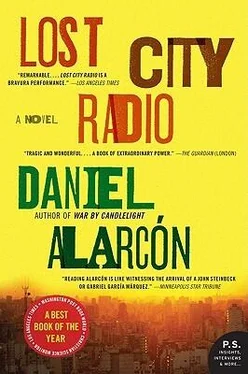“We were all very afraid for him. We told him, if the IL comes back and finds you have refused their gift, they’ll certainly kill all of you. But Hawa would not be convinced. He was a hunter. He spent most of his time on his canoe, deep in the forest, killing the animals he saw on the shores of the river: pythons, alligators, the spearfish you can only find three days’ walk from here. He said he had seen these IL. They were jokers, he said. He wasn’t afraid. I talked to him myself. What about the priest, I asked him. The priest had it coming, Hawa said.”
“And what happened to Hawa?”
“He left, with his two sons, for the war. Years ago. His wife stayed. And then she left too.” Zahir shrugged, as if to indicate the story was over.
“You’ve left out the best part, Don Zahir.”
“Have I?”
Adela nodded. Manau could make out the sly contours of her smile. The evening’s breezes had begun.
“What we did to the house.”
Zahir grinned. “Well, yes. Of course. What else could we do? We burned it.”
The empty house was a hazard. The IL were killers: what if they returned, and Hawa was away? They would kill someone else in the village just to make it right.
On a warm February evening, in honor of Independence Day, the priest’s home was burned. They prepared it with axes and saws: disassembling the simple structure until it was just a pile of wood and paper and old, musty clothes. A bonfire. It burned cleanly, part of the last Independence Day that would be celebrated in 1797 until the end of the war. By the next year, the men had begun to leave, and then the boys, and the conflict could be ignored no longer. Manau knew the story. No one was sad to see them go, because they were expected to return.
Zahir never left, and that must have been its own challenge. Almost every man his age went. Manau had heard him say it before, part apology, part denial: “I liked it here; why should I have left?”
Now Zahir recalled playing his guitar while everyone sang, while the fire burned. He sang; he danced. It seemed impossible that he could have forgotten this part. “Was it a beautiful festival, Adela? He doesn’t know, you must tell him!”
There was something not right with the story. Where did they bury the priest? Manau wondered. He pushed the question from his mind, and focused on the scene: the party, the breezy night, the towns people when they were still optimistic. He reached for her again, and touched her. She pinched his foot this time. A breeze curled around them.
“It was very beautiful,” Adela said.
MANAU WALKED Victor to the station. Adela’s boy. Adela. He took him by the hand to the front desk, where a receptionist typed disinterestedly with two fingers. They stood before her, Victor just tall enough to peek over the edge. They waited. A half-minute passed before she made eye contact.
“Yes?” the receptionist asked finally.
“We need to see Norma,” Manau said. He was tired, a kind of exhaustion he’d never felt before. “Norma,” he said to the boy, “will take care of you.”
The receptionist smiled. She had a round face and lipstick on her teeth, just a tiny red smudge of it, and Manau wondered if he should tell her. He didn’t.
“I’m sorry, that’s not possible,” the receptionist said. She pointed upwards, to small speakers in the ceiling. “She’s on the air.”
Of course she was. That was her voice filling the room, reading the news so sweetly. He hadn’t even noticed the sound before. It had registered in his mind as a lullaby.
“What is this about?” the receptionist asked.
“The boy,” Manau said. “He has a list for Lost City Radio.” He turned to Victor. “Show her. Show her the note.”
Victor took it from his pocket and passed it to the receptionist. She read it quickly, running her index finger beneath the words as she did. Turning the page over, she glanced at the list of missing, and then instructed Manau and Victor to sit. To be patient. To wait. She handed the note back and picked up the phone. She spoke in a low voice. They dropped their bags and slumped into the cushions of the sofa, while Norma read the news without comment, even-toned. She was masterful. Manau could hardly concentrate on the words.
That night in the jungle, on Zahir’s porch, when the breezes began, he excused himself and led Adela into the darkness, to love her. He carried with him the reed mat that Zahir’s wife had woven for him. Manau bade Zahir a good evening, stepped down the raised porch onto the ground, still soft from the afternoon shower. Adela asked him to wait, and he did, around the corner, just beyond the reach of the light. The moon had not yet risen, and the black night made him impatient. There were murmurings from the top of the stairs. The jungle breathed, noises of all kinds, but there was nothing to see in the inky darkness. Manau was aware of people walking by him in twos and threes, scarcely perceptible, dim shadows. Whoever they were, they said his name politely as they passed by: Manau, Mr. Manau, professor. Could everyone see but him? He smiled brightly, hoping the passersby — his students? his neighbors? — might mistake his smile for recognition. He couldn’t see a thing. It could have been the trees talking. Or any of a dozen ghosts that his pupils believed in. Nico was the latest phantom all the boys and girls claimed to see. Where? he asked. At the edge of the forest — where else? Manau, Manau, Manau. Have you seen Nico? they asked. No, I haven’t. Unless dreams count. They do, mister! the children clamored. Of course, dreams count! The children, like everyone in the village, were always accompanied. Manau was alone. He didn’t allow himself the luxury of believing in ghosts. Now he smiled in the darkness and waited. What were they discussing? It was this obliterating loneliness that Adela had begun to cure. Manau thought then that he didn’t miss the city anymore and never would again. He thought then that he would die here in this jungle redoubt, of old age, having mastered the antique language of the forest, having learned which plants brought nourishment and which were poisonous. It occurred to him to light a match, to survey his kingdom, but it flared and blew out in the breeze: an instant of flittering orange light — and that was all. Enough to see his hands. Clouds had blotted out the sky. It was a lightless, moonless night. Still, he would take her to the river or to the field. Or both. And he would love her.
Then he heard her descending the stairs, heard the creak of the wood. He turned back, but he couldn’t see her. The lamps had been extinguished, and the darkness was complete. Manau reached for her.
“Today is seven years since Zahir lost his hands,” she said.
“I know. He told me.”
“I had to pay my respects. Give him my apologies.” She sighed. “It was my boy that did it.”
Manau nodded, though he was sure she couldn’t see him. They were walking, he thought, toward the field. He could feel the soggy earth beneath his feet. Her voice, he noticed, had nearly cracked. Was she crying?
“It was the IL, not Victor,” Manau said to the darkness. He heard her sigh again. She must know I’m right, he thought. The boy is innocent. Except for her fingers between his, he might have been alone. “What does Zahir say?”
“He won’t accept money. I offer it to him every year. He says he deserved it.”
“He told me the same thing. What did he do?”
“I don’t know.”
They made their way to the field, walking through the town on instinct, muscle-memory: turn here, go straight, let the mud slather your feet, step over this log that has fallen across the path. Even Adela agreed it was the darkest night in years, and so the storm, when it appeared on the distant horizon, was welcome. Lightning shivered across the sky, and Manau turned in time to see her: Adela, made of silver.
Читать дальше












